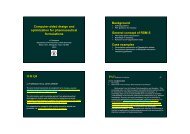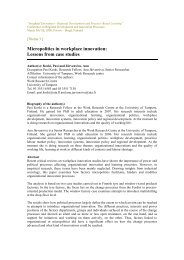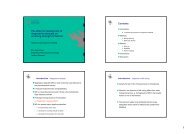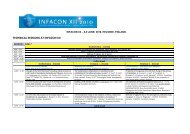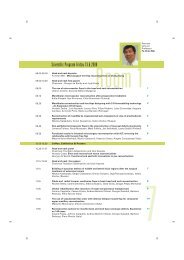Enhancing employees' innovation activity through motivational factors
Enhancing employees' innovation activity through motivational factors
Enhancing employees' innovation activity through motivational factors
Create successful ePaper yourself
Turn your PDF publications into a flip-book with our unique Google optimized e-Paper software.
“Insightful Encounters - Regional Development and Practice–Based Learning”<br />
Conference on Regional Development and Innovation Processes<br />
March 5th-7th, 2008, Porvoo - Borgå, Finland<br />
Aim of the research<br />
Traditional<br />
research<br />
Universal knowledge<br />
Theory building and<br />
testing<br />
Action research<br />
Knowledge in action<br />
Theory building and<br />
testing in action<br />
Type of knowledge<br />
acquired<br />
Nature of data<br />
Universal<br />
Covering law<br />
Context free<br />
Particular<br />
Situational<br />
Praxis<br />
Contextually embedded<br />
Validation<br />
Researcher’s role<br />
Logic, measurement<br />
Consistency of prediction<br />
and control<br />
Observer<br />
Experiential<br />
Actor<br />
Agent of change<br />
Researcher’s<br />
relationship to setting<br />
Detached<br />
Neutral<br />
Immersed<br />
Table 1: The main differences between action research and traditional research methodologies<br />
(Pavesi, Corso, Boer 2002)<br />
The main differences between traditional research and action research are seen in table 1. In using<br />
action research we are able to seek answer to question why some organisational change processes<br />
succeed and others do not. In some cases it is more valuable to observe the actors explicit actions<br />
than receive their cognitive intentions by for example by interviews. (Avison et al. 1999).<br />
Researchers work in close connection to the environment and people and this requires sensibility<br />
and the ability to make fast reflections in action and transcend existing theories into new and<br />
better ones. Gustavsen (1996) points out the communicative action in everyday practices arguing<br />
that language and communication processes are the key for change in social context at<br />
organizations development.<br />
Data collection<br />
The data has been collected during an Innovation Catcher process (For theoretical background see<br />
Paalanen and Konsti-Laakso 2007) which aims to reveal the hidden <strong>innovation</strong> potential from<br />
different levels of an organisation. Innovation catcher is one of the concrete <strong>innovation</strong> tools to<br />
illustrate the practice-based <strong>innovation</strong> activities (See Harmaakorpi and Tura 2006). It is<br />
developed in Lahti region in cooperation of Lappeenranta University of technology, Lahti unit,<br />
Lahti Science and Business Park and local companies.<br />
The data was acquired <strong>through</strong> an action research process. All together 14 interviews, duration<br />
from one hour to 1, 5 hours, were conducted during summer 2007. As the interview process<br />
evolved and the understanding and knowledge of the researchers was accumulated, some more<br />
detailed questions were added to the semi-structured interviews. Software Atlas.ti was used to<br />
help to analyze the data. The interview data was fed back into the process. The feedback from the



